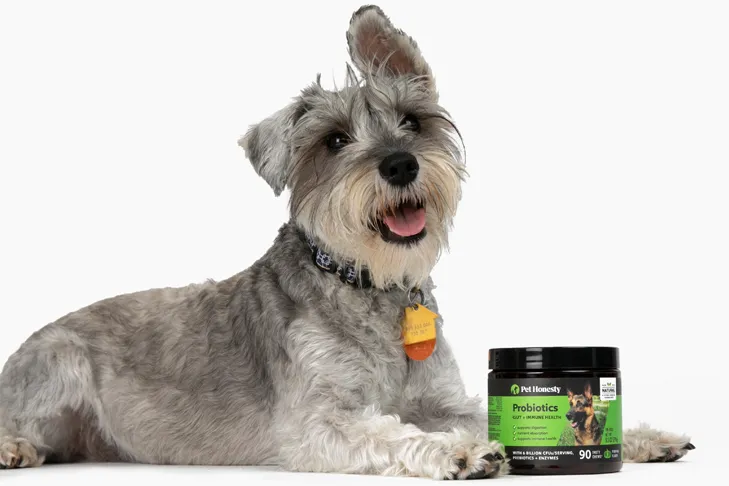Yeast infections can make your dog’s skin itchy, inflamed, and downright uncomfortable. These issues are especially common in dogs with allergies, often stemming from poor diet or excessive antibiotic use. If your furry friend is dealing with yeast overgrowth, your vet might suggest probiotics for dogs with yeast infections alongside dietary changes and treatments. Probiotics introduce beneficial live microorganisms to restore balance in the gut, skin, and ears, helping prevent these pesky infections. In this guide, we’ll explore how probiotics work, their benefits, and tips for choosing the right ones.
For dogs prone to related issues like ear infections, check out these supplements to prevent ear infections in dogs.
Understanding Yeast Infections in Dogs
Yeast, a type of fungus, naturally exists in small amounts on a dog’s skin, ears, and mucous membranes. Problems arise when it overgrows due to factors like allergies, bacterial infections, humid environments, or long-term antibiotics. This overgrowth often hits the ears first, causing scabs, waxy discharge, head tilting, balance issues, hair loss, greasy coats, or a sour milk smell.
Dogs with allergies are particularly vulnerable, as their compromised skin barrier allows yeast to thrive. Hot, humid conditions exacerbate this, making prevention crucial for breeds in warmer climates.
 Biewer Terrier laying down outdoors at the park.
Biewer Terrier laying down outdoors at the park.
The Role of the Microbiome and Probiotics
Every dog hosts a microbiome—a community of bacteria, fungi, and viruses living on and in the body. The gut microbiome, rich in “good bacteria,” aids digestion and nutrient absorption. Disruptions from poor diets or toxins can tip the balance, paving the way for yeast overgrowth.
Probiotics for dogs with yeast infections are live, non-pathogenic microorganisms like specific bacteria and yeasts. “When ingested in appropriate amounts, probiotics can confer health benefits for dogs,” explains Dr. Amy Attas, VMD, from City Pets in New York. These organisms mimic natural gut bacteria, resisting stomach acids to colonize the intestines. They support vitamin production from food and crowd out harmful pathogens.
Unlike antibiotics that wipe out good bacteria—leading to yeast blooms—probiotics rebuild that protective environment.
Key Benefits of Probiotics for Yeast-Prone Dogs
Probiotics offer wide-ranging support beyond yeast control. Available over-the-counter at pet stores or online, they’re safe for weaned puppies but always consult your vet first. Here’s what they do:
- Enhance nutrient absorption from meals
- Reduce allergy symptoms and inflammation
- Promote digestive health and regular bowel movements
- Inhibit yeast and harmful bacteria growth
- Boost immune function against infections
- Ease inflammatory bowel disease (IBD) or colitis
- Improve overall coat, energy, and well-being
For dogs with digestive woes, consider the best probiotic for dogs with loose stools.
Strains like Lactobacillus acidophilus and bifidobacteria are stars here. They produce lactic acid, acidifying the gut to make it hostile for yeast, which struggles in low-pH settings.
 Pet Honesty product image
Pet Honesty product image
How Probiotics Combat Yeast Infections Specifically
Probiotics restore microbial balance in the gut, ears, skin, and mucous membranes, creating an inhospitable space for yeast. Normal bacteria compete fiercely, preventing colonization. Post-antibiotics, they’re invaluable for repopulating good flora and averting secondary infections.
Even some yeasts, like Saccharomyces, act as probiotics for gut issues like diarrhea. E. coli strains in controlled doses can benefit too. For chronic ear or skin yeast, pairing probiotics with vet-recommended care yields real results—fewer infections, healthier skin, and happier dogs.
Vet-endorsed options shine; explore the best probiotic for dogs vet recommended.
Essential Tips for Choosing and Using Probiotics
Pick Dog-Specific Formulas
Human probiotics won’t cut it—bacterial profiles differ across species. Opt for canine-formulated liquids, capsules, or powders with dog-safe flavors. Avoid human products with toxic sweeteners like xylitol.
Choose Reputable Brands with Multiple Strains
Unregulated by the FDA, quality varies. Seek NASC-certified or vet-trusted brands listing CFU counts (colony-forming units) and multiple strains. Dog foods may claim probiotics, but they’re often underdosed; pair balanced kibble with dedicated supplements.
 Berger Picards laying down together in a field.
Berger Picards laying down together in a field.
For comprehensive gut support, try the best probiotic and prebiotic for dogs.
Follow Storage and Dosing Instructions
Live organisms demand care: refrigerate if required, check expirations, and dose precisely to avoid overload. Introduce gradually alongside diet changes to monitor tolerance. Some dogs may react to specific strains.
Dr. Attas notes promising anecdotal evidence: better appetites, firmer stools, fewer ear infections, and improved skin. Research is early, but probiotics as food supplements show strong potential without medication risks.
Explore more with the best pre probiotics for dogs.
In summary, probiotics for dogs with yeast infections are a safe, effective tool to restore balance, curb overgrowth, and enhance health. Consult your vet for tailored advice, monitor progress, and combine with quality nutrition. Your dog deserves relief—start with vet-approved probiotics today for itch-free, vibrant living. Share your experiences in the comments and explore our guides for more pet care tips!
